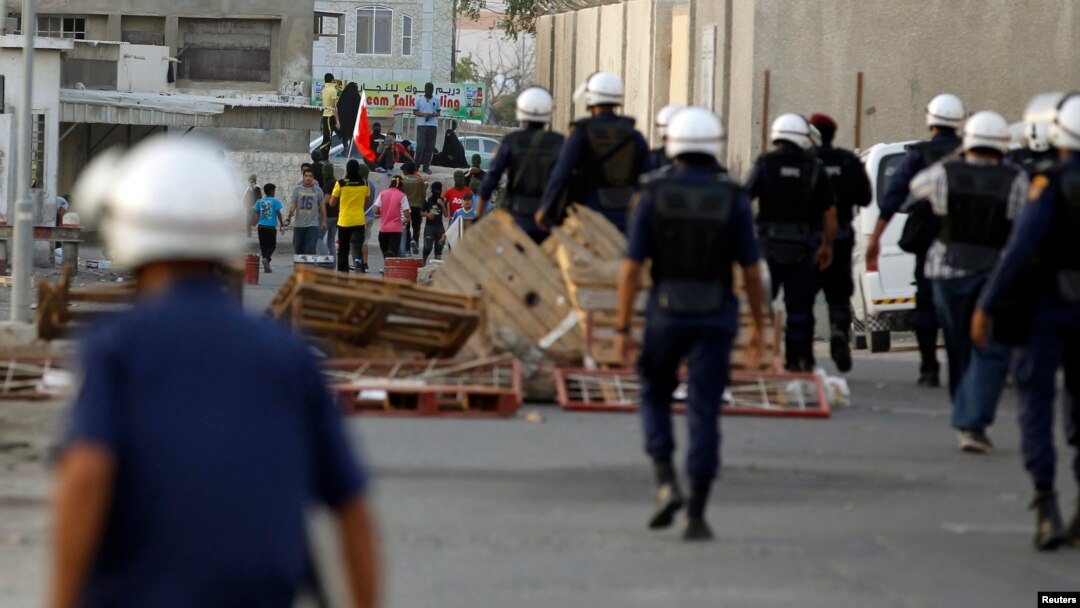LONDON —
New laws and lengthy jail terms for activists have put freedom of association in Bahrain under severe threat, according to a report from Human Rights Watch.
“The Bahraini authorities are going to great lengths to prevent ordinary Bahraini citizens from freely expressing themselves and associating with others on the streets of Bahrain to press for change," said Human Rights Watch Britain director David Mepham.
The 87-page report published Thursday condemns what Human Rights Watch says are major restraints on the Freedom of Association in Bahrain.
It highlights the draft law on civil organizations and institutions, which was approved by the government last year. The report says the provisions are much more restrictive than an earlier draft written in 2007 - and in many respects worse than the 1989 law, which is in effect today.
The campaign group says the draft, which was sent to parliament this January, would allow Bahraini authorities to deny an organization’s right to register if they think society as a whole “does not need its services.”
Mepham says the report criticizes Bahraini authorities for using the law to dissolve organizations and ban public gatherings.
“There is a track record over the last decade or more of the Bahraini authorities being unwilling to allow peaceful dissent and peaceful criticism," he said. "And that in many ways has been stepped up in the last two years since the popular uprisings began in 2011.”
Thousands were arrested and dozens died during the crackdown on pro-democracy demonstrations in Bahrain that began in February 2011.
U.S. criticism
A U.S. State Department report released in April also criticized the rights situation in Bahrain.
It voiced concern over citizens' inability to change their government peacefully, and the arrest and detention of protesters on vague charges, which it said sometimes leads to their torture in detention.
The State Department also criticized the lack of due process in trials of political and human rights activists.
Attempts by VOA to reach Bahraini authorities for comment on Thursday’s report were unsuccessful.
But in response to the U.S. State Department report in April, the kingdom said it has a “full commitment to comply with the human rights principles and standards in confronting terror, which targets Bahrain and innocent civilians."
Mepham disagrees.
“Nobody at the senior level in the Bahraini security forces, the Bahraini defense forces, or the Bahraini police has been held to account for their role in the torture, death, imprisonment and beating of hundreds of people that took place throughout 2011. So there is a massive failure in terms of accountability.”
Mepham says Bahrain’s international allies, including Britain and the United States, should put more pressure on Bahrain to improve its human rights record.
The European Union’s High Representative Catherine Ashton and other EU ministers are to meet with the Gulf Cooperation Council in Bahrain later this month.
“The Bahraini authorities are going to great lengths to prevent ordinary Bahraini citizens from freely expressing themselves and associating with others on the streets of Bahrain to press for change," said Human Rights Watch Britain director David Mepham.
The 87-page report published Thursday condemns what Human Rights Watch says are major restraints on the Freedom of Association in Bahrain.
It highlights the draft law on civil organizations and institutions, which was approved by the government last year. The report says the provisions are much more restrictive than an earlier draft written in 2007 - and in many respects worse than the 1989 law, which is in effect today.
The campaign group says the draft, which was sent to parliament this January, would allow Bahraini authorities to deny an organization’s right to register if they think society as a whole “does not need its services.”
Mepham says the report criticizes Bahraini authorities for using the law to dissolve organizations and ban public gatherings.
“There is a track record over the last decade or more of the Bahraini authorities being unwilling to allow peaceful dissent and peaceful criticism," he said. "And that in many ways has been stepped up in the last two years since the popular uprisings began in 2011.”
Thousands were arrested and dozens died during the crackdown on pro-democracy demonstrations in Bahrain that began in February 2011.
U.S. criticism
A U.S. State Department report released in April also criticized the rights situation in Bahrain.
It voiced concern over citizens' inability to change their government peacefully, and the arrest and detention of protesters on vague charges, which it said sometimes leads to their torture in detention.
The State Department also criticized the lack of due process in trials of political and human rights activists.
Attempts by VOA to reach Bahraini authorities for comment on Thursday’s report were unsuccessful.
But in response to the U.S. State Department report in April, the kingdom said it has a “full commitment to comply with the human rights principles and standards in confronting terror, which targets Bahrain and innocent civilians."
Mepham disagrees.
“Nobody at the senior level in the Bahraini security forces, the Bahraini defense forces, or the Bahraini police has been held to account for their role in the torture, death, imprisonment and beating of hundreds of people that took place throughout 2011. So there is a massive failure in terms of accountability.”
Mepham says Bahrain’s international allies, including Britain and the United States, should put more pressure on Bahrain to improve its human rights record.
The European Union’s High Representative Catherine Ashton and other EU ministers are to meet with the Gulf Cooperation Council in Bahrain later this month.


